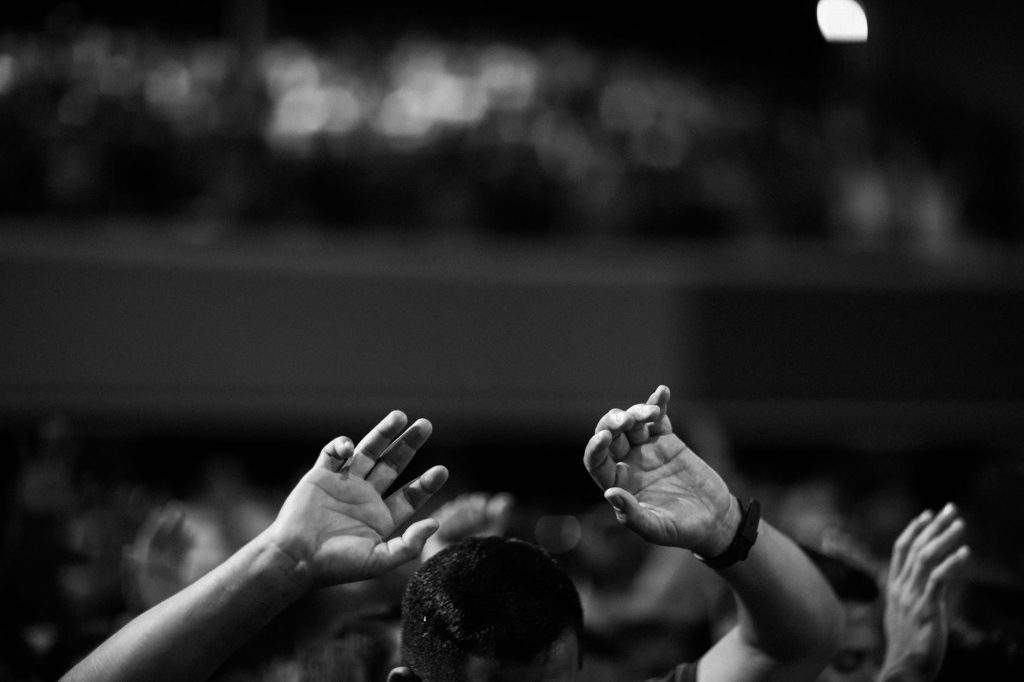So, I have something on my heart that I feel I need to share with you about the season of Lent coming up. I am wondering if this Lent things need to be a bit different, for me, and perhaps us as a church. Have a think and a pray to see what resonates with you.
You see, I am wondering if this year we need to press into the ancient traditions of Lent with fresh vigour and commitment, and more specifically I am wondering if this Lent we need to take seriously the way Lent has been gifted to the church as a way of calling us back to repentance.
I am pretty sure that I am not alone for having a relatively relaxed attitude to Lent. I know that it is good. I know that it can be powerful. I know that it has been a Christian rhythm across the centuries and been a core part of the Christian calendar from really early days. But I also know that I have so often treated it lightly, and found ways to make it all more palatable, more doable, less constraining, less difficult.
But this year, as I have been reflecting on it these past weeks and getting ready, I have been re-visiting the significance of the place of fasting in the story of the bible and God’s people. And it’s pretty strong stuff.
Here I have found that fasting, penitence and repentance go together. Here I have found that fasting is not optional but required. Here I have found that fasting is a normal spiritual practice, this side of the age to come, for disciples of Jesus. “When you fast…” says Jesus, not “If you fast…”. Here I have found that fasting is one of the most vital, and meaningful, and powerful ways that God shapes his people, renews his people and recommissions his people again and again.
With this on my heart, I am writing to invite you to join me, and join together as a church, in a shared journey of fasting and repentance, of prayer and penitence, this Lent.
…..
At the beginning of the Ash Wednesday service (which is always such a great way to enter into the season of Lent) the liturgical introduction says this:
Brothers and sisters in Christ, since early days Christians have observed with great devotion the time of our Lord’s passion and resurrection and prepared for this by a season of penitence and fasting.
Ash Wednesday Service Introduction
By carefully keeping these days, Christians take to heart the call to repentance and the assurance of forgiveness proclaimed in the gospel, and so grow in faith and in devotion to our Lord.
I invite you, therefore, in the name of the Church, to the observance of a holy Lent, by self-examination and repentance; by prayer, fasting, and self-denial; and by reading and meditating on God’s holy word.
Re-reading as many verses of scripture on it as possible, I have discovered that fasting is not primarily about self-discipline or self-control – it’s more often about mourning, about despair, about sorrow even.
In both the Old and New Testaments, fasting and mourning seem powerfully linked. Fasting is an external, physical, and practical, way of expressing an internal, spiritual, and authentic posture of the heart – serving as a visible and tangible embodiment of grief, and sorrow, and repentance, and regret – seeking divine intervention, divine mercy, divine rescue.
And I am wondering if there is a reason, I have been drawn to reflect on this and to share it with you all…
And there’s more… Fasting is also about renewal. It’s about the mending of what is broken, the repairing of what has been fragmented. And, because it is normal to mess up, it was common practice in Israel’s story for them to fast, as they repeatedly sought to mend their relationship with the one true God. And so, again and again, we see how the practice of fasting, during times of mourning and regret, reflected the deep spiritual and emotional dimensions of Israelite life and the interconnectedness of faith, lamentation, and communal solidarity. Fasting, in the bible, pulls the people together again, back to God, back into their true identity, back into holiness, back to being set apart.
For the last few years, if I am honest, I have been somewhat lackadaisical about Lent. Perhaps, at worst, I have been pretending to myself that I was taking it seriously while, in hidden ways, drifting through it half-heartedly, while even at best I fear I have been downgrading it simply to a practice spiritual self-improvement rather than radical self-denial and heartfelt repentance.
But this year, as I look out at the state of the church, at the state of the nation, at the state of the world, and see crisis and chaos, and as I look inward and reflect on my own apathy or levels of passion, I sense the call of the Spirit on my soul to once again cry out to God for mercy, to call out to God for rescue, and to cast myself upon him for renewal – personal, familial, communal, ecclesial, national and global renewal.
If my people, who are called by my name, will humble themselves and pray and seek my face and turn from their wicked ways, then I will hear from heaven, and I will forgive their sin and will heal their land.
2 Chronicles 7:14
What this means for me personally and perhaps for us as a church family
For me, I know I must wake up my soul and take hold of this 6 week, 40 day practice of repentance and mourning once again – to take it seriously and to embrace it fully. I know I need it. I know my ministry needs it. I know my/our church needs it. I know my nation needs it. I need a proper Lent, not a half-hearted, pale imitation version. I need a proper fast, a sincere and passionate resistance to pattern of this age. I need a whole-hearted Lent.
There are many examples to follow:
There is Daniel
Then I turned to the Lord God, to seek an answer by prayer and supplication with fasting and sackcloth and ashes. I prayed to the Lord my God and made confession, saying,
Daniel 9.3-6, 17-19
‘Ah, Lord, great and awesome God, keeping covenant and steadfast love with those who love you and keep your commandments, we have sinned and done wrong, acted wickedly and rebelled, turning aside from your commandments and ordinances. We have not listened to your servants the prophets, who spoke in your name to our kings, our princes, and our ancestors, and to all the people of the land. Now therefore, O our God, listen to the prayer of your servant and to his supplication, and for your own sake, Lord, let your face shine upon your desolated sanctuary. Incline your ear, O my God, and hear. Open your eyes and look at our desolation and the city that bears your name. We do not present our supplication before you on the ground of our righteousness, but on the ground of your great mercies. O Lord, hear; O Lord, forgive; O Lord, listen and act and do not delay! For your own sake, O my God, because your city and your people bear your name!’
Or there is Moses
Moses was there with the Lord forty days and forty nights without eating bread or drinking water. And he wrote on the tablets the words of the covenant—the Ten Commandments.
Exodus 34:28
Or there is David
David pleaded with God for the child. He fasted and spent the nights lying in sackcloth on the ground.
2 Samuel 12:16-23
Or there is Joel
“Even now,” declares the Lord, “return to me with all your heart, with fasting and weeping and mourning. Rend your heart and not your garments. Return to the Lord your God, for he is gracious and compassionate, slow to anger and abounding in love, and he relents from sending calamity. Blow the trumpet in Zion, declare a holy fast, call a sacred assembly. Gather the people, consecrate the assembly; bring together the elders, gather the children, those nursing at the breast. Let the bridegroom leave his room and the bride her chamber. Let the priests, who minister before the LORD, weep between the portico and the altar.”
Joel 2:12-17
Or Ezra
There, by the Ahava Canal, I proclaimed a fast, so that we might humble ourselves before our God and ask him for a safe journey for us and our children, with all our possessions. I was ashamed to ask the king for soldiers and horsemen to protect us from enemies on the road, because we had told the king, “The gracious hand of our God is on everyone who looks to him, but his great anger is against all who forsake him.” So, we fasted and petitioned our God about this, and he answered our prayer.
Ezra 8:21-23
And of course, there is Jesus
Jesus, full of the Holy Spirit, left the Jordan and was led by the Spirit into the wilderness, where for forty days he was tempted by the devil. He ate nothing during those days, and at the end of them he was hungry.
Luke 4:1-2
Enough of the why – what about the how?
Christians practice fasting in various ways and the specific approach we take often depends on individual preferences, health considerations, and spiritual goals.
Here are some common methods of fasting observed during Lent:
- One Full-Day Fast per Week
Some Christians choose to observe a full day fast once a week during Lent. This may involve abstaining from all solid food and consuming only liquids or a small amount of simple, non-stimulating food.
- Intermittent Fasting
This method involves restricting the time window in which one consumes food each day. For example, we might choose to eat only during a specific period, such as a 6 or 8 hour window, and abstain from food during the remaining hours.
- Partial Fast
Some of us might opt for a partial fast, which could involve reducing the size of our meals, skipping specific meals (e.g., breakfast or dinner), or eating only one full meal a day.
- Traditional Fast
Many Christians choose to abstain from certain types of food during Lent, especially meat and dairy products. This may involve adopting a vegetarian or vegan diet for the duration of Lent.
- Non-food fasts
In addition to dietary restrictions, some Christians choose to fast by giving up a specific comfort or habit, such as social media, entertainment, or a particular indulgence.
- Combination of Methods:
Many individuals adopt a combination of fasting methods, adjusting their approach based on personal circumstances and health considerations. For example, someone might choose to abstain from certain foods, practice intermittent fasting, and incorporate a full-day fast periodically.
Remember Jesus’ teaching about fasting
Regardless of the kind of fasting we adopt it is important that we remember Jesus’ teaching on fasting. As with all aspects of law observance, Jesus highlighted the importance of both our inner attitude of humility and sincerity and also seeking to avoid any obvious reward from others – avoiding the desire for looking good in front of others. Fasting is about casting ourselves on God’s mercy more than anything else and for this reason he tells us to do it in secret.
6 Tips for a Helpful and Manageable Lenten Fasting Pattern
- Start Small:
If new to fasting, consider starting with a manageable goal and gradually increasing the level of fasting commitment over the Lenten season.
- Choose a Realistic Approach:
Select a fasting method that aligns with your health, daily routine, and call from God.
- Stay Hydrated:
Regardless of the fasting method chosen, staying hydrated is crucial. Ensure an adequate intake of water throughout the day.
- Seek Spiritual Guidance:
If uncertain about which fasting method is appropriate, seek guidance from a others who might provide support and advice tailored to your individual circumstances.
- Pair Fasting with Spiritual Practices:
Combine fasting with increased prayer, Scripture reading, and other spiritual disciplines to enhance the overall Lenten experience.
- Listen to Your Body:
Pay attention to your body’s signals and make adjustments as needed. If a particular fasting method causes undue stress or health concerns, consider modifying the approach.
Remember that the purpose of Lenten fasting is not merely to endure a period of deprivation but to foster deeper connection with God and to seek his mercy for yourself and for our church at this time. It’s important to approach fasting with a spirit of humility, repentance, and sincerity.
Some prayers to help you while you are fasting
Here are some prayers you can use while fasting. Use and edit as you see fit.
Opening prayer
Holy God,
holy and strong,
holy and immortal,
have mercy upon us.
Let us pray for grace to keep Lent faithfully.
Silence is kept.
Almighty and everlasting God,
you hate nothing that you have made
and forgive the sins of all those who are penitent:
create and make in us new and contrite hearts
that we, worthily lamenting our sins
and acknowledging our wretchedness,
may receive from you, the God of all mercy,
perfect remission and forgiveness;
through Jesus Christ your Son our Lord,
who is alive and reigns with you,
in the unity of the Holy Spirit,
one God, now and for ever.
Amen.
The sacrifice of God is a broken spirit;
a broken and contrite heart God will not despise.
Let us come to the Lord, who is full of compassion,
and acknowledge our transgressions in penitence and faith.
Father eternal, giver of light and grace,
we have sinned against you and against our neighbour,
in what we have thought, in what we have said and done,
through ignorance, through weakness,
through our own deliberate fault.
We have wounded your love and marred your image in us.
We are sorry and ashamed, and repent of all our sins.
For the sake of your Son Jesus Christ,
who died for us, forgive us all that is past;
and lead us out from darkness
to walk as children of light. Amen.
A prayer of thanksgiving
Father God, it is indeed right and good
to give you thanks and praise,
almighty God and everlasting Father,
through Jesus Christ your Son.
For in these forty days
you lead us into the desert of repentance
that through a pilgrimage of prayer and discipline
we may grow in grace and learn to be your people once again.
Through fasting, prayer and acts of service
you bring us back to your generous heart.
Through study of your holy word
you open our eyes to your presence in the world
and free our hands to welcome others
into the radiant splendour of your love.
As we prepare to celebrate the Easter feast
with joyful hearts and minds
we bless you for your mercy
and join with saints and angels
for ever praising you and saying
Holy, Holy, Holy Lord
God of power and might,
heaven and earth are full of your glory.
Hosanna in the highest.



